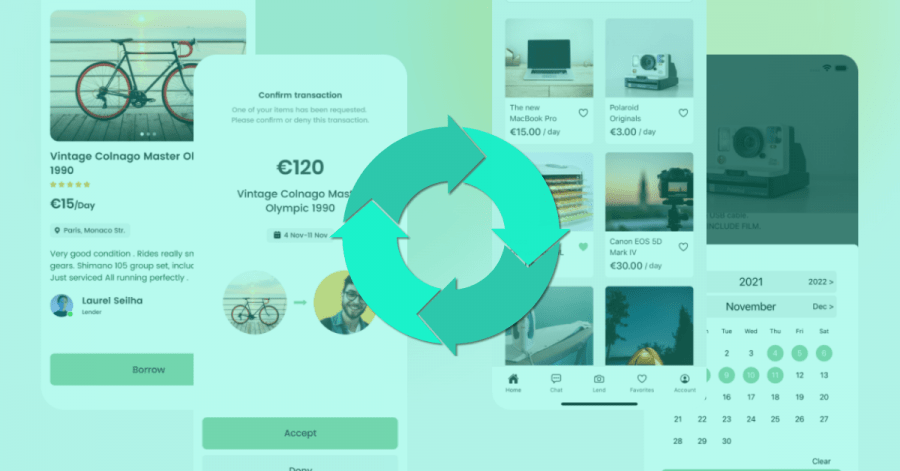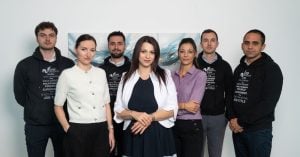Buying and consuming things the way we used to is a recipe for disaster. It’s time we changed things around. But as much as we desire and strive for it, change is hard. This is where solutions like toboro, a Romanian-based young startup with a mobile app that enables the easy rental and borrowing of products between peers, come into play. Toboro was recently awarded with the grand prize (10K EUR) at the 4th edition of the Future Makers incubator organized by Social Innovation Solutions in Romania.
The 5-month incubation program culminated with a pitching session in which toboro competed against 21 other teams from 5 countries in the region (Romania, Hungary, Bulgaria, Greece, and Serbia). The other two startups on the podium sound just as promising. Swim.me, a smart wearable device aimed to orientate blind swimmers and created by a team of engineers in Greece won the second prize. The third prize went to another Greek startup, Dataphoria, a platform that uses data analytics and AI tools to support sustainability-minded organizations collect data, optimize operations, and automate impact measurement.
The premise of toboro is simple: why keep so many things in your storage closet when others may need it, and you can also gain some extra money out of it? Alternatively, why would you buy a product you are likely going to use only once? For owners, the app lets you upload photos of the product you want to rent, set the availability, and decide the price. You can also set up the best times for handover and re-collection. At the end of the rental period, money is transferred securely.
Intrigued to learn more about the rental peer-to-peer platform, The Recursive talked to Adina Teleuca, founder and CEO. Adina has extensive PR and employer branding experience, and has recently launched a consulting boutique that offers marketing, project management, and IT solutions.
The Recursive: toboro was the first step in your entrepreneurial journey. What prompted you to follow this path? What are the biggest joys it has brought you?
Adina Teleuca: Even when I was working in a large corporation, I had an entrepreneurial mindset, working on innovative projects, and finding solutions for some broader issues, such as diversity and inclusion. This process of identifying the need, finding the solution, pitching for capital in front of the stakeholders and implementing it, prepared me for the next step – entrepreneurship.
Now, I am in an accelerated process of learning and discovery, both about how to build a business and myself. And even if at first, as an entrepreneur, you may seem inexperienced or idealistic, we know that this is how most of the successful projects started. This gives me the fuel I need to overcome the challenges.
At toboro, you implement a circular business model. What are the advantages of this model for the three key dimensions for responsible businesses: people, planet, and profit?
The triple bottom line is becoming essential for businesses. There is an increasing pressure to make the transition from a traditional model to a circular one. We can no longer act as if resources are unlimited. We are starting to see that both consumers and businesses are becoming more aware of the impact their actions have on the planet. But changes will not happen overnight. New businesses have more flexibility and agility, but those with a traditional model need to be supported in this transition.
At toboro, we believe that economic, social and technological progress must be connected with environmental issues in order to create a sustainable, equitable and safe world. We want to be part of the solution, and to offer a viable alternative to consumption to both people and businesses.
Congratulations for winning the grand prize at Future Makers! What did this competition mean to you and the team? What are your plans with the funds received?
The Future Makers Incubator helped us a lot to set up a timeframe and a framework which would allow us to move forward constantly during these 4 months. And most importantly was the fact that we had the opportunity to have access to a large network of entrepreneurs, peers, mentors, corporates and investors and to learn from them.
We will use these funds for the first stage of testing and for market validation. As we know, speed is key for any startup success, so we have a lot of things to do in the next period of time.
What is the biggest challenge you expect going further with toboro, and how are you planning against it?
toboro proposes a new way of consuming, which, we hope, will create a disruption in the current one. Nowadays, we buy more than we need, we accumulate things that we no longer use and implicitly we produce a lot of waste. We have to make better use of materials and resources.
But this shift brings with it three big challenges: changing consumption habits, facing the competition – which we want to turn into partners, and increasing the level of trust between peers. For that, we need to build new normative behaviors, as other startups have done before us. Just as before it seemed like a crazy idea to sleep in a stranger’s house and get in a stranger’s car, so it may seem now to use a stranger’s objects. But history has shown us that norms can be changed, as long as we build models that work for everyone.
We know from research that there are fewer women entrepreneurs, as well as funding available for women. Has being a woman entrepreneur posed any challenges to you? What do you think is needed to level the playing field for women?
Right after I took this step in entrepreneurship, I came across some statistics showing that in 2019, all-female teams raised 30% less than all-male teams at the pre-seed stage, despite performing better on average, and that the pandemic has affected women entrepreneurs worldwide, increasing even more the gender gap. Moreover, 93% of tech investment in Europe goes to all-male teams.
The female population in Europe is higher than the man population with almost 25.3 million, which means we could also have more female consumers than male. And still, most of the startups and companies who produce and deliver these services are male-led organizations. After learning all these, I wasn’t discouraged, but I am aware that I must be prepared for the reality that is reflected in this figure. We definitely need to address these issues and inequalities and one way to do it is to empower women to take the lead, starting from school. Creativity, innovation and knowledge have no gender. Then why should compensation and recognition have one?








